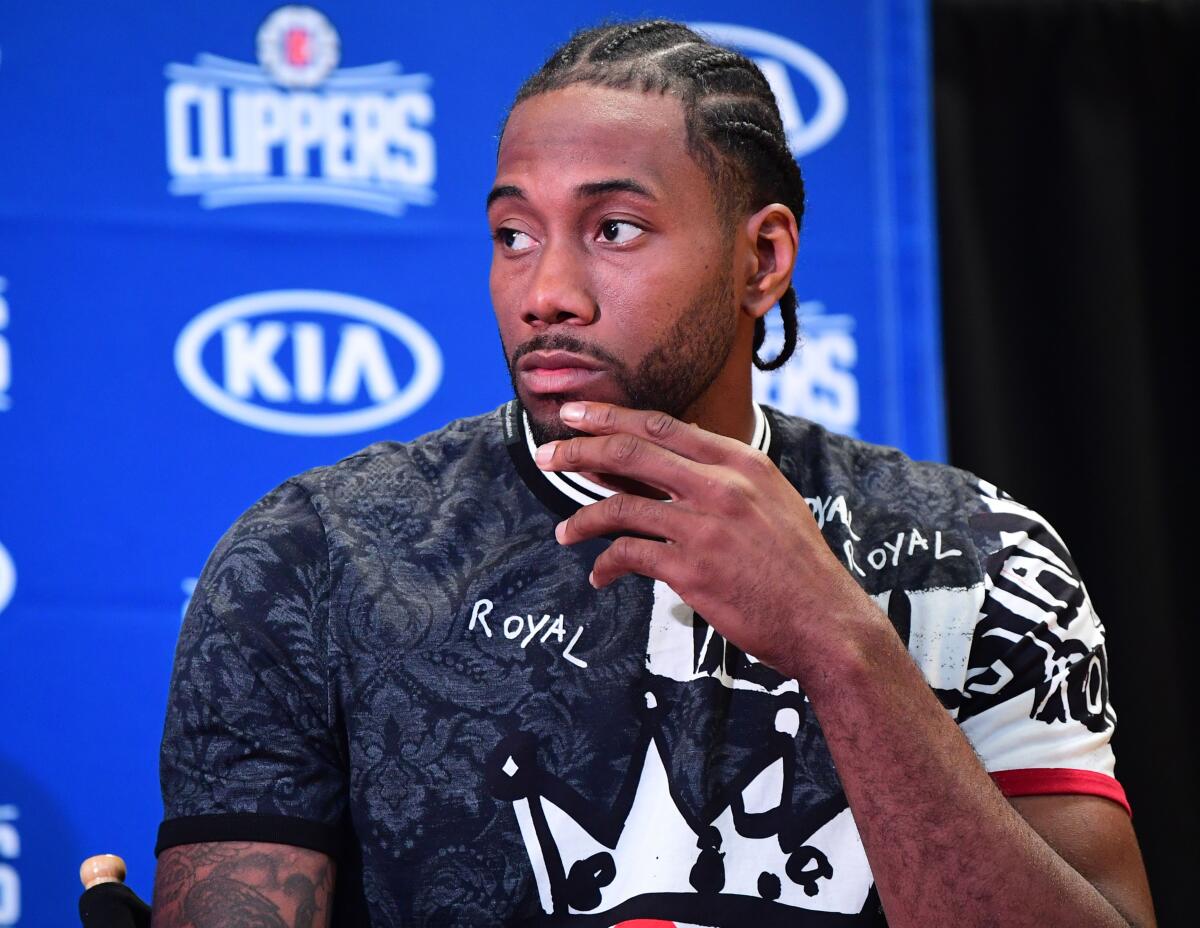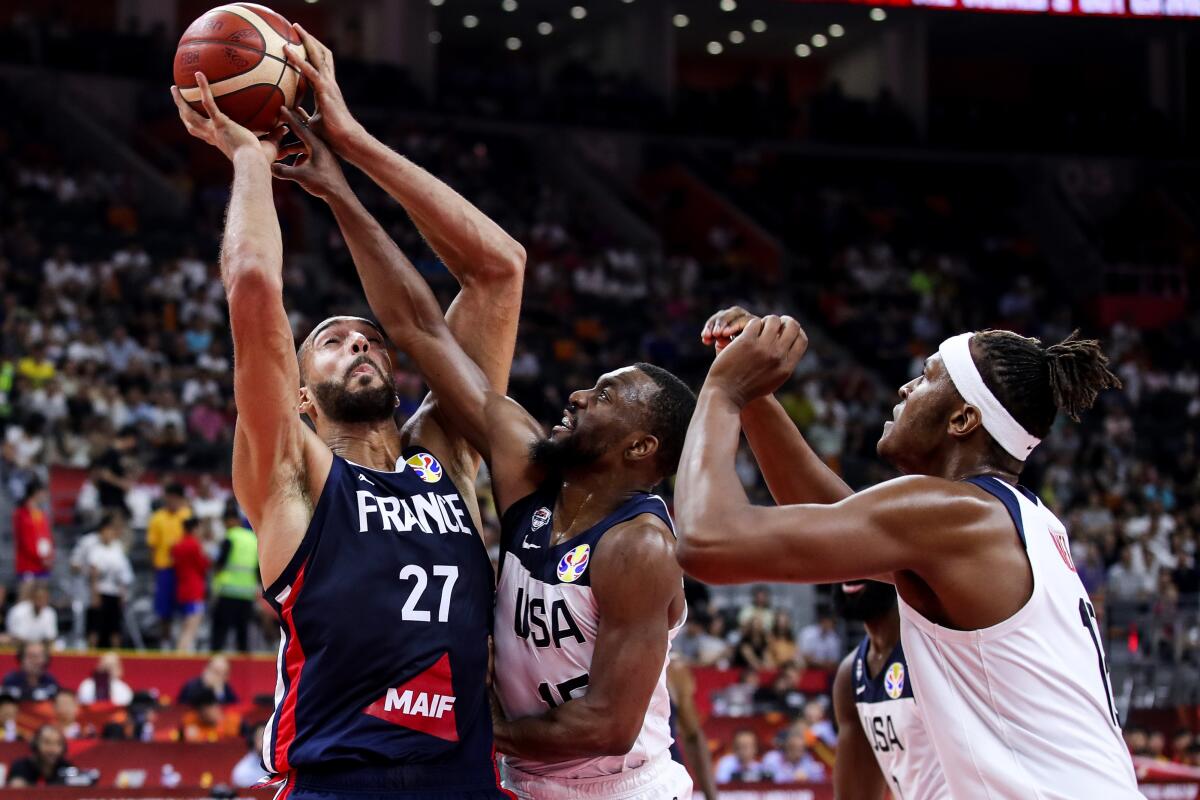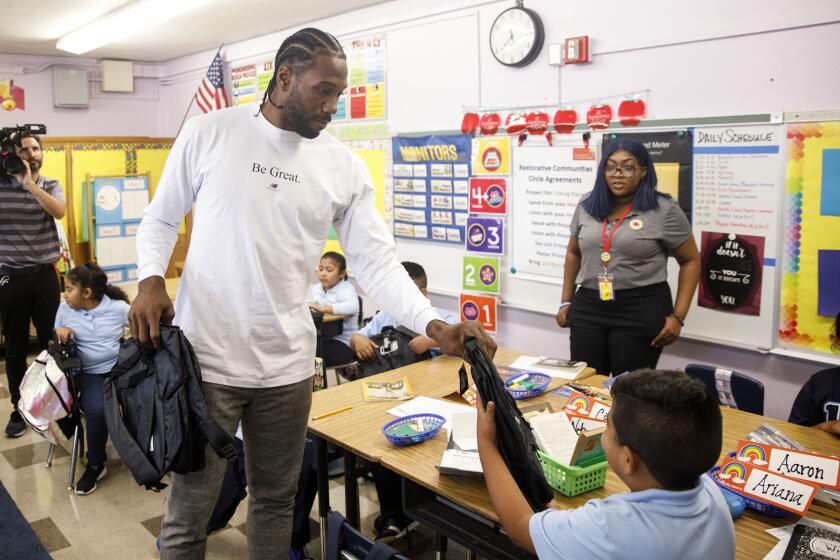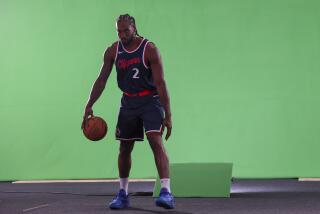Column: Team USA won’t medal at FIBA World Cup. Is Kawhi Leonard somehow to blame?

Team USA, who despite all the defections and absentees are the most talented team in the FIBA World Cup, will leave China without a medal after losing to France 89-79 Wednesday.
And it’s all Kawhi Leonard’s fault?
The Clippers’ superstar isn’t a bad place to start as Team USA’s decision makers try to unpack why and how the men’s national team lost with NBA stars in international competition for the first time since 2006.
Whether it’s resting stars, FIBA’s decision to change the World Cup scheduling, general disinterest or a dip in top-tier American talent, trouble could be on the horizon for American basketball’s future on the world stage.
Leonard’s success last season cannot be untied from Toronto’s maintenance plan for him — the “load management” that’s now become a critical part of the NBA lexicon. It, simply, meant the Raptors would try and “be smart” with Leonard as he recovered from an injury from the season prior, keeping him out of back-to-back games, trying to limit his minutes when he did play and using sports science to monitor his body.
The goal was to have Leonard be at peak performance at the most important time of the season — the playoffs — and it worked as well as Toronto could’ve imagined.
Leonard was the defining force of the postseason, delivering iconic moments like a Game 7 winner against Philadelphia, a defensive masterpiece in a multi-overtime game against Giannis Antetokounmpo and the Bucks and MVP performance in the Finals to dethrone the Warriors.
Clippers superstar Kawhi Leonard understands the realities children and families are facing as the new school year begins, LZ Granderson writes.
It was easy enough for the Raptors to make the choices they did — they acquired Leonard to matter in the playoffs, and if it meant sacrificing some in the regular season, so be it.
And faced with the choice of an extra month-plus of international commitments or preparing for the NBA regular season, a bunch of the American talent pool chose the upcoming season, especially considering FIBA changed the schedule of the world championships, putting them one summer ahead of the Olympics.
Whether it was in favor of keeping their offseason routines, whether it was because of family commitments or whether it was to keep minor injuries from becoming nagging ones, Team USA went to China without Damian Lillard, Kyle Lowry, Anthony Davis, James Harden, CJ McCollum, Bradley Beal, Eric Gordon, De’Aaron Fox, DeMar DeRozan, Tobias Harris, J.J. Redick, Kevin Love, Trae Young and Andre Drummond.
Add that to a pool of players from America’s A Team who weren’t ever going to China AND Japan for the Olympics, and the United States was left with Kemba Walker as the lone All-NBA player willing to play.
A lot of top players didn’t compete for Team USA in 2006, the last loss prior to Wednesday, with just four All-NBA players deciding to spend their summers playing for America — though those four included a 21-year-old LeBron James, a 22-year-old Carmelo Anthony and a 24-year-old Dwyane Wade. That team also had future stars Chris Paul, Chris Bosh and Dwight Howard — all 22 or younger.
With hindsight, it’s perfectly fine that team lost — the future foundation of the next decade of Team USA got built, and it was a decade in which the Americans had no peers. But will we look back at this roster with the same “How did these guys ever lose?” wonder? Doubtful.
Because in 2006, so many of the NBA’s best young players were American. In 2019, that’s just not the case.
The top three players in win shares from the 2013 NBA Draft are Antetokounmpo (Greece), Rudy Gobert (who dominated the interior for France on Wednesday) and Steven Adams (New Zealand). The top Americans from that draft? Victor Oladipo (rehabbing), McCollum and … Otto Porter?

In 2014, the best players are Cameroonian (Joel Embiid) and Serbian (Nikola Jokic). The top scorer in the 2015 NBA draft, Karl-Anthony Towns, played internationally for the Dominican Republic. The best players from the 2016 Draft? Australian (Ben Simmons), Canadian (Jamal Murray), Bahamian (Buddy Hield) and Cameroonian (Pascal Siakam). Last year’s top rookie, Luka Doncic, is Slovenian.
Losing in the world championships, like Team USA did on Wednesday, is embarrassing, but losing in the Olympics is a disaster — and it’s still really unlikely that America won’t bounce back in Tokyo.
While the timing is less than ideal — the Olympics begin in late July on the heels of the NBA season instead of later in the summer — the talent pool will be much better because the Olympics mean much more to NBA stars than the FIBA World Cup does.
But what about in 2024? As players like James, Davis, Harden, Stephen Curry and Kevin Durant graduate out of the program, can America count on Donovan Mitchell (he was great in the loss Wednesday), Zion Williamson and whatever other young stars become the anchors of American basketball?
The next 10 years shouldn’t have been a big concern after 2006. The next 10 years after Wednesday? That’s a little different.
More to Read
Go beyond the scoreboard
Get the latest on L.A.'s teams in the daily Sports Report newsletter.
You may occasionally receive promotional content from the Los Angeles Times.












